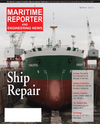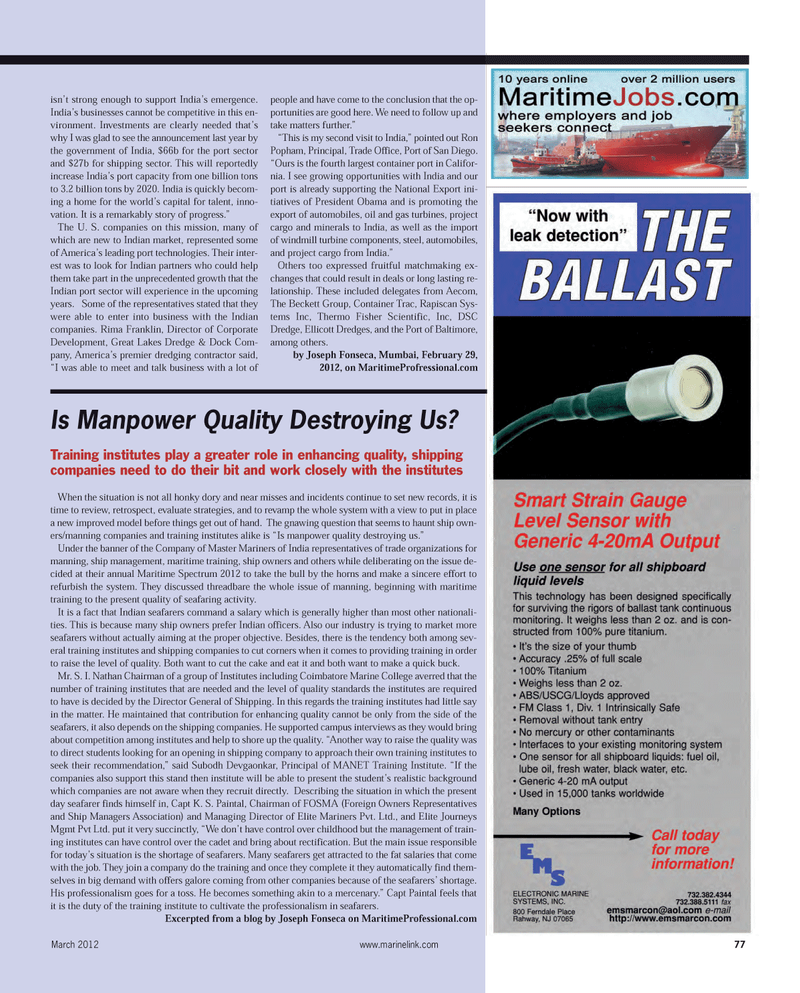
Page 77: of Maritime Reporter Magazine (March 2012)
The Ship Repair Edition
Read this page in Pdf, Flash or Html5 edition of March 2012 Maritime Reporter Magazine
March 2012 www.marinelink.com 77Is Manpower Quality Destroying Us? Training institutes play a greater role in enhancing quality, shipping companies need to do their bit and work closely with the institutesWhen the situation is not all honky dory and near misses and incidents continue to set new records, it is time to review, retrospect, evaluate strategies, and to revamp the whole system with a view to put in place a new improved model before things get out of hand. The gnawing question that seems to haunt ship own- ers/manning companies and training institutes alike is ?Is manpower quality destroying us.? Under the banner of the Company of Master Mariners of India representatives of trade organizations for manning, ship management, maritime training, ship owners and others while deliberating on the issue de- cided at their annual Maritime Spectrum 2012 to take the bull by the horns and make a sincere effort to refurbish the system. They discussed threadbare the whole issue of manning, beginning with maritime training to the present quality of seafaring activity. It is a fact that Indian seafarers command a salary which is generally higher than most other nationali- ties. This is because many ship owners prefer Indian officers. Also our industry is trying to market more seafarers without actually aiming at the proper objective. Besides, there is the tendency both among sev- eral training institutes and shipping companies to cut corners when it comes to providing training in order to raise the level of quality. Both want to cut the cake and eat it and both want to make a quick buck. Mr. S. I. Nathan Chairman of a group of Institutes including Coimbatore Marine College averred that the number of training institutes that are needed and the level of quality standards the institutes are required to have is decided by the Director General of Shipping. In this regards the training institutes had little say in the matter. He maintained that contribution for enhancing quality cannot be only from the side of the seafarers, it also depends on the shipping companies. He supported campus interviews as they would bring about competition among institutes and help to shore up the quality. ?Another way to raise the quality was to direct students looking for an opening in shipping company to approach their own training institutes to seek their recommendation,? said Subodh Devgaonkar, Principal of MANET Training Institute. ?If the companies also support this stand then institute will be able to present the student?s realistic background which companies are not aware when they recruit directly. Describing the situation in which the present day seafarer finds himself in, Capt K. S. Paintal, Chairman of FOSMA (Foreign Owners Representatives and Ship Managers Association) and Managing Director of Elite Mariners Pvt. Ltd., and Elite Journeys Mgmt Pvt Ltd. put it very succinctly, ?We don?t have control over childhood but the management of train- ing institutes can have control over the cadet and bring about rectification. But the main issue responsible for today?s situation is the shortage of seafarers. Many seafarers get attracted to the fat salaries that come with the job. They join a company do the training and once they complete it they automatically find them- selves in big demand with offers galore coming from other companies because of the seafarers? shortage. His professionalism goes for a toss. He becomes something akin to a mercenary.? Capt Paintal feels that it is the duty of the training institute to cultivate the professionalism in seafarers. Excerpted from a blog by Joseph Fonseca on MaritimeProfessional.com isn?t strong enough to support India?s emergence. India?s businesses cannot be competitive in this en- vironment. Investments are clearly needed that?s why I was glad to see the announcement last year by the government of India, $66b for the port sector and $27b for shipping sector. This will reportedly increase India?s port capacity from one billion tons to 3.2 billion tons by 2020. India is quickly becom-ing a home for the world?s capital for talent, inno- vation. It is a remarkably story of progress.? The U. S. companies on this mission, many of which are new to Indian market, represented some of America?s leading port technologies. Their inter- est was to look for Indian partners who could help them take part in the unprecedented growth that the Indian port sector will experience in the upcoming years. Some of the representatives stated that they were able to enter into business with the Indian companies. Rima Franklin, Director of CorporateDevelopment, Great Lakes Dredge & Dock Com- pany, America?s premier dredging contractor said, ?I was able to meet and talk business with a lot of people and have come to the conclusion that the op- portunities are good here. We need to follow up and take matters further.? ?This is my second visit to India,? pointed out Ron Popham, Principal, Trade Office, Port of San Diego. ?Ours is the fourth largest container port in Califor- nia. I see growing opportunities with India and our port is already supporting the National Export ini-tiatives of President Obama and is promoting the export of automobiles, oil and gas turbines, project cargo and minerals to India, as well as the import of windmill turbine components, steel, automobiles,and project cargo from India.? Others too expressed fruitful matchmaking ex- changes that could result in deals or long lasting re-lationship. These included delegates from Aecom, The Beckett Group, Container Trac, Rapiscan Sys- tems Inc, Thermo Fisher Scientific, Inc, DSC Dredge, Ellicott Dredges, and the Port of Baltimore,among others.by Joseph Fonseca, Mumbai, February 29, 2012, on MaritimeProfressional.com MR March 12 # 10 (73-80):MR Template 3/6/2012 8:50 AM Page 77

 76
76

 78
78
